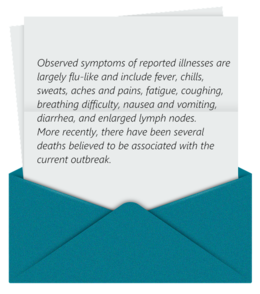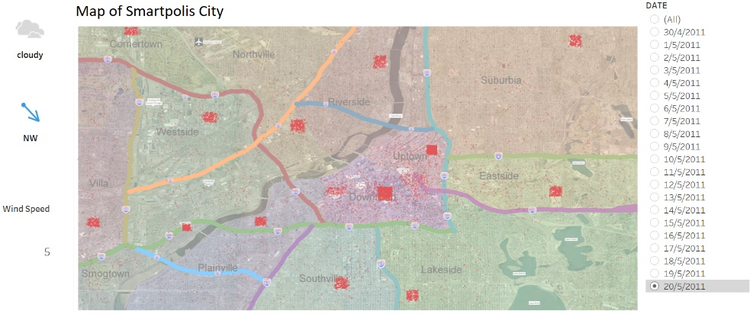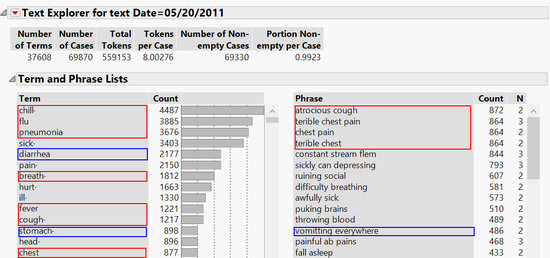Difference between revisions of "ISSS608 2017-18 T1 Assign WANG RUI Investigation step2"
Ruiwang.2016 (talk | contribs) |
Ruiwang.2016 (talk | contribs) |
||
| (5 intermediate revisions by the same user not shown) | |||
| Line 26: | Line 26: | ||
<div><font size = 5>'''''6 Steps to the Truth: '''''</font></div> | <div><font size = 5>'''''6 Steps to the Truth: '''''</font></div> | ||
<div><big>'''Step #2: Verify Diagnosis.'''</big></div> | <div><big>'''Step #2: Verify Diagnosis.'''</big></div> | ||
| − | |||
[[File:wrletter.png|left|260px]] | [[File:wrletter.png|left|260px]] | ||
| Line 36: | Line 35: | ||
<br/>In this section, I will validate this information using the microblog message collected. </div> | <br/>In this section, I will validate this information using the microblog message collected. </div> | ||
<br/><br/><br/> | <br/><br/><br/> | ||
| − | On | + | On May 20, large crowd of people were observed at hospitals in different zones. To investigate what these people were talking about, I selected all messages posted near hospitals and label the senders according to their IDs. These IDs are marked as potential patients. |
[[File:wrpatient.png|center|750px]] | [[File:wrpatient.png|center|750px]] | ||
| − | Then the message | + | Then the message contents are studied using text explorer in JMP. The results are shown below: |
[[File:wrpatient2.png|center|550px]] | [[File:wrpatient2.png|center|550px]] | ||
| + | Common words mentioned including chill, flu, pneumonia, diarrhea, breath, flu and so on which match the information provided. | ||
| + | Further observation on the symptoms reveals that there might be two different types. One is Inhalation related which involving key words like cough, breath, pneumonia, flu and the other is gastrointestinal related which involving key words like stomach, vomit, nausea. | ||
| + | <br/> | ||
| − | + | 13 Key words related to symptom are selected for identifying early stage patient as well as tracing the orign “chill, flu, pneumonia, pain, breath, hurt, fever, cough, chest, stomach, vomit, nausea, diarrhea”. | |
| − | + | <br/> | |
| + | Hypothesis is made that there are two epidemics on-going at the same time, and different people are infected. Evidence is two different characteristics identified between inhalation-related and gastrointestinal-related epidemic. | ||
| + | <br/> | ||
| + | <b>Inhalation </b> | ||
| + | *fever | ||
| + | *breath | ||
| + | *chill | ||
| + | *flu | ||
| + | *pneumonia | ||
| + | <b>Gastrointestinal </b> | ||
| + | *stomach | ||
| + | *nausea | ||
| + | *vomit | ||
| + | *diarrhea | ||
| + | This hypothesis will be verified in the following analysis. | ||
{| | {| | ||
|- | |- | ||
| − | |style = "background:#FFFFFF" Width = | + | |style = "background:#FFFFFF" Width = 63%| |
<div align="Left"> | <div align="Left"> | ||
| − | [[ISSS608_2017-18_T1_Assign_WANG_RUI_Investigation|<big>'''Back to | + | [[ISSS608_2017-18_T1_Assign_WANG_RUI_Investigation step1|<big>'''Back to Step #1: Understand the Data.'''</big>]]</div> |
|| | || | ||
<div alight='right'> | <div alight='right'> | ||
| − | [[ISSS608_2017-18_T1_Assign_WANG_RUI_Investigation step3|<big>'''Next to Step #3: Perform Descriptive Epidemiology on Time.'''</big>]] | + | [[ISSS608_2017-18_T1_Assign_WANG_RUI_Investigation step3|<big>'''Next to Step #3:<br/> Perform Descriptive Epidemiology on Time.'''</big>]] |
|| | || | ||
|} | |} | ||
Latest revision as of 17:52, 16 October 2017
|
|
|
|
|
|
(a) to ensure that the disease has been properly identified, since control measures are often disease-specific;
(b) to rule out laboratory error as the basis for the increase in reported cases.
According to the information on the letter, observed symptoms are largely flu-like and include fever, chills, sweats, aches and pains, fatigue, coughing, breathing difficulty, nausea and vomiting, diarrhea, and enlarged lymph nodes. More recently, there have been several deaths believed to be associated with the current outbreak.
In this section, I will validate this information using the microblog message collected.
On May 20, large crowd of people were observed at hospitals in different zones. To investigate what these people were talking about, I selected all messages posted near hospitals and label the senders according to their IDs. These IDs are marked as potential patients.
Then the message contents are studied using text explorer in JMP. The results are shown below:
Common words mentioned including chill, flu, pneumonia, diarrhea, breath, flu and so on which match the information provided.
Further observation on the symptoms reveals that there might be two different types. One is Inhalation related which involving key words like cough, breath, pneumonia, flu and the other is gastrointestinal related which involving key words like stomach, vomit, nausea.
13 Key words related to symptom are selected for identifying early stage patient as well as tracing the orign “chill, flu, pneumonia, pain, breath, hurt, fever, cough, chest, stomach, vomit, nausea, diarrhea”.
Hypothesis is made that there are two epidemics on-going at the same time, and different people are infected. Evidence is two different characteristics identified between inhalation-related and gastrointestinal-related epidemic.
Inhalation
- fever
- breath
- chill
- flu
- pneumonia
Gastrointestinal
- stomach
- nausea
- vomit
- diarrhea
This hypothesis will be verified in the following analysis.



